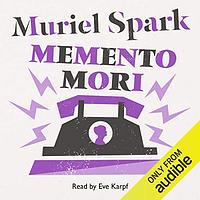Take a photo of a barcode or cover
The foreword of this book described Spark as a combination of Angela Thirkell and Barbara Pym and, although I haven't read Pym yet, the comparison to Thirkell's wit is apt.
This book focuses on a cast of mainly septuagenarians and octogenarians. The cast of people are in various stages of physical and mental fitness. I immediately felt bad for how a husband was treating his wife, whose ability to remember the present had taken a major hit. Thinking about spousal expectations and gender roles at the time this book hit home how, in some ways, the expectation of women's roles and rights within a marriage have come a long way.
Memento Mori is basically a meditation on death. If you're expecting much of a plot, you may be disappointed. But, if you're interested in a character study, you may find the book much more interesting.
I'm now interested in reading more of Sparks's work.
This book focuses on a cast of mainly septuagenarians and octogenarians. The cast of people are in various stages of physical and mental fitness. I immediately felt bad for how a husband was treating his wife, whose ability to remember the present had taken a major hit. Thinking about spousal expectations and gender roles at the time this book hit home how, in some ways, the expectation of women's roles and rights within a marriage have come a long way.
Memento Mori is basically a meditation on death. If you're expecting much of a plot, you may be disappointed. But, if you're interested in a character study, you may find the book much more interesting.
I'm now interested in reading more of Sparks's work.
funny
slow-paced
Plot or Character Driven:
Character
Strong character development:
No
Loveable characters:
Yes
Diverse cast of characters:
No
Flaws of characters a main focus:
Yes
dark
lighthearted
slow-paced
Plot or Character Driven:
A mix
Strong character development:
No
Loveable characters:
No
Diverse cast of characters:
No
Flaws of characters a main focus:
Yes
Memento mori-"remember that you will die"-seems as bareboned and physically static as a stage drama, but with a few deft strokes Spark creates a world. The reader, finding himself surrounded by the going ons of English mid 20th C seniors in their 80s and 90s (and unexpectedly able) might be surprised at being content to linger in this odd social milieu. A small insular world of elderly characters who've long known each other as family, lovers, maids, and sometimes friends has its table overturned when they separately begin to receive anonymous phone calls always stating "remember that you will die." Acerbic, unsentimental, and sharply funny, Memento Mori is a cocktail without sugar,but delicious.
while I enjoyed reading this, it is quite vapid. meandering in the forgettable sense, without inspired prose. The characters are quite good, but I can’t think of a valid reason to recommend this book.
mysterious
medium-paced
Plot or Character Driven:
A mix
Strong character development:
No
Loveable characters:
No
Diverse cast of characters:
No
Flaws of characters a main focus:
Yes
An unusual book -- all the main characters are in their 70s or 80s and most of them receive an unusual (for its truthfulness) prank phone call: "Remember you must die." The set-up sounds like it has the makings of a murder mystery but it is nothing of the kind. Instead, it is a closely observed comedy of manners and a pretty funny one at that. I enjoyed this a lot, which is saying something since I started it directly after Jane Bowles' Two Serious Ladies and most books would have suffered by comparison. I especially enjoyed the character of Alec Warner, a retired sociologist who keeps a carefully cross-referenced library of notecards on the actions and reactions of the elderly friends in his circle. He goes so far as to try to get people to take their own temperature before, during, and after discussions that he knows will be unpleasant.
Some favorite moments:
"it's difficult," said Miss Taylor, "for people of advanced years to start remembering they must die. It is best to form the habit while young."
* * *
"Her face puckered in folds under the desk-lamp. Two thoughts intruded simultaneously. One was: I am really very tired; and the other: I am not a bit tired, I am charging ahead with great energy. She lifted the pen again and continued to put the wavering marks across the page."
* * *
"She always *was* a bitch," said Godfrey, as if her death were the ultimate proof of it.
* * *
Henry Mortimer said: 'If I had my life over again I should form the habit of nightly composing myself to thoughts of death. I would practise, as it were, the remembrance of death. There is no other practice which so intensifies life. Death, when it approaches, ought not to take one by surprise. It should be part of the full expectancy of life. Without an ever-present sense of death life is insipid. You might as well live on the whites of eggs.'
Oddly life-affirming…
Dame Lettie Colston is upset. She has been receiving anonymous phone calls from a man who simply tells her “Remember you must die” – a chilling message at any time, but more so when one is already in the latter stage of life. It seems the man knows where she is at all times, too, since the message comes for her even when she is someone else’s house. And then the phone calls start arriving for other people, too – Dame Lettie’s brother, Godfrey; his wife, Charmian; even retired Inspector Mortimer, who has been investigating the source of the calls. Each person reports a different voice – the caller is variously young or old, cultured or common. One even claims the caller is female. And the recipients act differently, too: Dame Lettie with growing paranoia, Godfrey with blustering anger, Charmian with insouciant disregard. To some the caller is real – a human to be feared – while to others the caller is Death himself, merely reminding them all of the inevitable.
There’s a lot of humour in this black comedy, which is as much about ageing as it is about death. As Spark’s books usually are, it is relentlessly upper-middle-class, so that none of the elderly characters have to deal with poverty. Their old age is cushioned by servants and carers, or private nursing homes. They had been novelists or poets or people of leisure, spending their days on charitable enterprises or simply frittering their time away on good living. But Spark shows how age reverses the power structures in society and even in families – those who once ruled becoming dependent on and even scared of those they once dominated. Money is seen as both blessing and curse, a means to make life comfortable, but also a temptation to the greedy who aspire to inherit. It’s a cruel but accurate depiction, which is what makes it a rather shivery read, despite the high entertainment value.
I listened to the audiobook which is narrated brilliantly by Eve Karpf. She creates a whole range of voices and personas for the quite large cast of characters, and brings out the surface humour while never hiding the darkness lurking beneath. It’s a great performance, and I’ll look out for more of her narrations.
To call the characters unlikeable would be a bit unkind, although they mostly are. They are people who have lived long lives, made mistakes and sometimes behaved badly along the way, perhaps not contributed as much as they think to the advancement of society or culture, perhaps won’t be missed as much as they might have hoped. They are, in fact, ordinary, which is their tragedy, since they each feel in their hearts that they are extraordinary. Age, rather than death, is shown as the great leveller, when physical or intellectual frailty make us all dependant on the goodwill of others. One of the characters, Jean Taylor, a former servant of Charmian’s, is consigned to a ward in a geriatric hospital, a feature of the then new National Health Service, designed with the best intentions of taking care of elderly people who can no longer care for themselves. Sparks skewers the soullessness of these places, where, if one is lucky, one’s physical needs are catered for, but where one is subjected to a system that patronises and infantilises its residents, who have basically been parked there to wait for death. Spark also shows how the elderly in such institutions may find themselves vulnerable to the abuse of power or simple incompetence of staff.
The mystery of the phone calls is simply a background to the more interesting set of relationships, past and present, of the cast of characters, and the effect that age has on them. As the book progresses we learn of long-ago indiscretions and scandals, and we see how the importance of these diminishes as they fade into the distant past. Those secrets that once meant everything now seem trivial, irrelevant, and yet we cling to them, almost lovingly, as a sign that we were once interesting. Spark shows us that that unconditional love we felt for our little children is somewhat harder to maintain when the child is in his fifties and has turned out to be a disappointment. But Spark always tempers her biting cruelty with a kind of amused affection – a sense that she includes herself and her reader as members of the same club as her characters. It is the self-recognition that stings most sharply but also makes us laugh most.
I thoroughly enjoyed this one. It gets gradually darker as it draws to the end, but then, that’s life, isn’t it? By the time one is eighty, happy endings are unlikely – the most we can hope for is a dignified death and perhaps to be remembered kindly for a few years before we fade into oblivion. Strange that I found a book with this kind of message entertaining and, oddly, quite life-affirming! As the saying goes, old age is no fun, but it’s better than the alternative...
www.fictionfanblog.wordpress.com
Dame Lettie Colston is upset. She has been receiving anonymous phone calls from a man who simply tells her “Remember you must die” – a chilling message at any time, but more so when one is already in the latter stage of life. It seems the man knows where she is at all times, too, since the message comes for her even when she is someone else’s house. And then the phone calls start arriving for other people, too – Dame Lettie’s brother, Godfrey; his wife, Charmian; even retired Inspector Mortimer, who has been investigating the source of the calls. Each person reports a different voice – the caller is variously young or old, cultured or common. One even claims the caller is female. And the recipients act differently, too: Dame Lettie with growing paranoia, Godfrey with blustering anger, Charmian with insouciant disregard. To some the caller is real – a human to be feared – while to others the caller is Death himself, merely reminding them all of the inevitable.
There’s a lot of humour in this black comedy, which is as much about ageing as it is about death. As Spark’s books usually are, it is relentlessly upper-middle-class, so that none of the elderly characters have to deal with poverty. Their old age is cushioned by servants and carers, or private nursing homes. They had been novelists or poets or people of leisure, spending their days on charitable enterprises or simply frittering their time away on good living. But Spark shows how age reverses the power structures in society and even in families – those who once ruled becoming dependent on and even scared of those they once dominated. Money is seen as both blessing and curse, a means to make life comfortable, but also a temptation to the greedy who aspire to inherit. It’s a cruel but accurate depiction, which is what makes it a rather shivery read, despite the high entertainment value.
I listened to the audiobook which is narrated brilliantly by Eve Karpf. She creates a whole range of voices and personas for the quite large cast of characters, and brings out the surface humour while never hiding the darkness lurking beneath. It’s a great performance, and I’ll look out for more of her narrations.
To call the characters unlikeable would be a bit unkind, although they mostly are. They are people who have lived long lives, made mistakes and sometimes behaved badly along the way, perhaps not contributed as much as they think to the advancement of society or culture, perhaps won’t be missed as much as they might have hoped. They are, in fact, ordinary, which is their tragedy, since they each feel in their hearts that they are extraordinary. Age, rather than death, is shown as the great leveller, when physical or intellectual frailty make us all dependant on the goodwill of others. One of the characters, Jean Taylor, a former servant of Charmian’s, is consigned to a ward in a geriatric hospital, a feature of the then new National Health Service, designed with the best intentions of taking care of elderly people who can no longer care for themselves. Sparks skewers the soullessness of these places, where, if one is lucky, one’s physical needs are catered for, but where one is subjected to a system that patronises and infantilises its residents, who have basically been parked there to wait for death. Spark also shows how the elderly in such institutions may find themselves vulnerable to the abuse of power or simple incompetence of staff.
The mystery of the phone calls is simply a background to the more interesting set of relationships, past and present, of the cast of characters, and the effect that age has on them. As the book progresses we learn of long-ago indiscretions and scandals, and we see how the importance of these diminishes as they fade into the distant past. Those secrets that once meant everything now seem trivial, irrelevant, and yet we cling to them, almost lovingly, as a sign that we were once interesting. Spark shows us that that unconditional love we felt for our little children is somewhat harder to maintain when the child is in his fifties and has turned out to be a disappointment. But Spark always tempers her biting cruelty with a kind of amused affection – a sense that she includes herself and her reader as members of the same club as her characters. It is the self-recognition that stings most sharply but also makes us laugh most.
I thoroughly enjoyed this one. It gets gradually darker as it draws to the end, but then, that’s life, isn’t it? By the time one is eighty, happy endings are unlikely – the most we can hope for is a dignified death and perhaps to be remembered kindly for a few years before we fade into oblivion. Strange that I found a book with this kind of message entertaining and, oddly, quite life-affirming! As the saying goes, old age is no fun, but it’s better than the alternative...
www.fictionfanblog.wordpress.com
dark
mysterious
medium-paced






